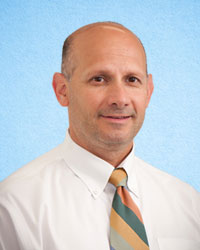The WVU Cancer Institute at Wheeling Hospital features a Comprehensive Cancer Program, as designated by the American College of Surgeons.
The center treats most types of cancers. Its team of physicians is known for its experience, knowledge and contributions to the profession. The members are backed by a talented staff of nurses, therapists and researchers. Together, they provide rapid evaluation and deliver compassionate care in a modern and comfortable setting.
Comprehensive Care
At the cancer center, state-of-the-art technology is used in conjunction with advanced treatment techniques to provide the highest standard of care to patients. The cancer unit provides not only for the physical needs of the cancer patient, but also for the ongoing emotional, social, and spiritual support of the patient and family. Education is a central focus of daily routine care. An approach of frank, open and honest discussion is maintained throughout regarding the disease process, treatment options, treatment consequences, and available resources. A significant aspect of oncology care also includes active discharge planning.
The WVU Cancer Institute at Wheeling Hospital provides radiation therapy and outpatient chemotherapy. It uses high dose rate (HDR) brachytherapy for the treatment of a variety of cancers on an out-patient basis.
Services
The institute offers the following services:
- 3D conformal radiation therapy
- Breast brachytherapy
- Calypso Beacon implantation
- Clinical trials
- Fiducial implantation
- Genetic screening
- HDR (high dose rate)
- IGRT (image guided radiotherapy)
- Immunotherapy – high dose IL-2 and interleukin-2
- IMRT (intensity modular radiation therapy)
- LDR (low dose rate)
- Lung brachytherapy
- Monoclonal antibodies
- Outpatient chemotherapy
- Telemedicine
- Tumor registry
Radiation Oncology
The state-of-the-art, 16,500-square-foot Radiation Oncology Division is equipped with the following:
- Electronic portal imaging
- Four CMS 3-D treatment planning computers
- High dose rate brachytherapy
- Intensity modulation radiation therapy
- One monotherapy linear accelerator
- Two dual energy linear accelerators with multi-leaf collimators
- Two simulators
- Variseed treatment planning computer
Medical Oncology
The Medical Oncology Division complements the Radiation Oncology Division by providing a full range of standard cancer treatments with the newest drug protocols, chemotherapy regiments, immunotherapy, monoclonal antibodies, genetic screening and clinical trial opportunities.
The 7,200-square-foot offices of the Medical Oncology Division include the latest technologies to administer:
- Hepatic infusional chemotherapy
- Intraperitoneal chemotherapy
- Intrathecal chemotherapy
- Intravenous chemotherapy
- Intravenous pump chemotherapy
Patient Navigators
At the WVU Cancer Institute at Wheeling Hospital, highly-trained, compassionate patient navigators will provide individualized attention to help guide you through the health care system. They are specialized in the areas of breast cancer; head and neck cancer; melanoma; gastro-intestinal cancer; and patient resources.
By advocating on your behalf, they will enhance your communication with health care staff and providers. In addition, they will help reduce much of the confusion and stress you may be experiencing.
The navigators also will work with you to locate the resources and support you need. This may include identifying the appropriate sources to help pay for your care. To ensure that your continuum of care goes as smoothly as possible, the navigators will streamline your health care appointments, keeping track of follow-up care and routine exams.
Assistance to you and your family in making informed decisions also will be provided by our navigators.
Fresh Start
Fighting cancer can take a big toll on patients’ physical and mental state. At the same time, however, treatment and recovery also can have adverse effects that may not be so visible. Focusing on cancer patients’ mental and spiritual health, while at the same time treating the cancer itself, is the purpose of Fresh Start, a program offered by the WVU Cancer Institute at Wheeling Hospital. Conducted at the hospital’s Howard Long Wellness Center, Fresh Start is for patients either dealing with or recovering from cancer treatments. Participants do not have to be patients of Wheeling Hospital to join Fresh Start, but they must have a physician referral. Fresh Start is based on the theory that exercise, diet, education and support can help boost reserves. It provides personalized fitness and diet programs designed to help strengthen and refresh the body, mind and spirit. The therapists believe this helps speed recovery and may prevent recurrence.
For more information on Fresh Start, call 304-243-2908.
Locations
WVU Cancer Institute at Wheeling Hospital
1 Medical Park
Wheeling, WV 26003
Radiology Oncology Division
Phone: 304-243-3490
Fax: 304-243-5047
Medical Oncology Division
Phone: 304-243-6442
Fax: 304-243-3715
Wheeling Hospital has a long history of conducting clinical cancer trial research. After in-depth evaluation of the hospital’s personnel, equipment and procedures, it was the first site in the state granted membership in the Radiation Therapy Oncology Group (RTOG). With the consolidation of the RTOG, NSABP (National Surgical Adjuvant Breast and Bowel Project) and GOG (Gynecologic Oncology Group) into the NRG Oncology, the radiation and medical oncology departments at Wheeling Hospital are fully integrated and of good standing with the NRG. NRG trials are open at both WVU Medicine and Wheeling Hospital, offering our patients the opportunity to be treated on a clinical trial at both facilities. Wheeling Hospital continues its status as a regional referral center for cancer evaluation and care, and this responsibility helps direct its future for the communities it serves.
We are always interested in recruiting new participants for one of the many clinical trials being offered. Visit the WVU Cancer Institute’s Clinical Trials pages to learn more about the program and the clinical trials that are being offered.
What are clinical trials?
Clinical trials are research studies conducted with volunteer patients. They focus on either the prevention or treatment of diseases. Prevention trials recruit healthy people to study agents that have the potential of stopping disease before it ever starts.
Treatment trials target people suffering from specific diseases to test the effectiveness of new medications, compare standard treatments with new ones, or to test a combination of medications and other treatments, such as surgery or radiation.
Are clinical trials safe?
Risks and side effects exist with any medical treatment, whether it is a standard treatment or a clinical trial. Our trials have many safeguards to protect the health and safety of our patients.
Treatments are carefully studied in laboratories before they are used with patients. Any research involving patients must be approved by the Institutional Review Board (IRB).
The IRB is made up of doctors, administrators, ethics specialists, and members of the general public. The IRB reviews every clinical trial to protect the rights and welfare of the patients.
- Patients considering a clinical trial receive verbal and written information about the trial, including information about any known risks or side effects.
- Patients must sign a consent form before entering a trial.
- Patients have the right to stop participating in a trial at any time.
- Patients are carefully monitored by exams, blood tests, x-rays, and phone calls. This means that any changes in a patient’s condition are promptly detected and examined.
- Data on a patient’s condition are constantly checked by the clinical trial sponsor.
- Patients are informed of new information that emerges during a clinical trial, such as when data accumulate about adverse effects or new, more convenient dosing schedules.
Who participates?
Do any of these statements describe you?
- I am looking for the most current treatments for my condition.
- I have tried all of the current suggested treatments for my condition.
- I want to help find cancer answers.
- I want to help myself and others.
If one or more of these statements sounds like you – and you meet all of the eligibility requirements – then you could be someone who participates in a clinical trial.
How can you participate?
If you are considering participating in a clinical trial, ask your physician or healthcare professional these questions:
- Is there a clinical trial available for treating my condition?
- What other treatment options exist?
- What are the benefits of a trial?
- What are the risks of a trial?
- What costs are involved?
- What medications or treatments will be used?
- How often is treatment given during the trial?
- How long will the trial last?
- Does my physician support the clinical trial?
- How will the results of the clinical trial be made public?
- Are there extra visits or a lot of additional traveling?
Need more information?
If you would like to know more about cancer clinical trials, please visit the National Cancer Institute website.
Additionally, you may search for any clinical trial at: ClinicalTrials.gov.





